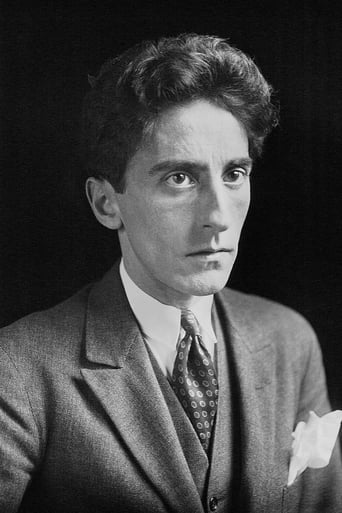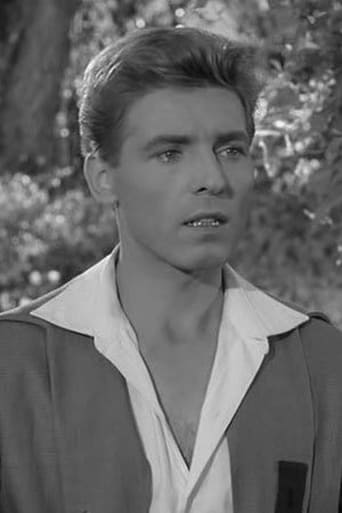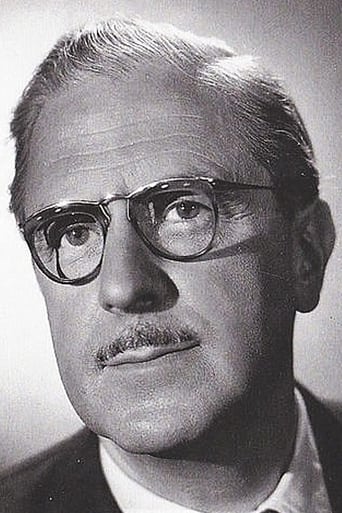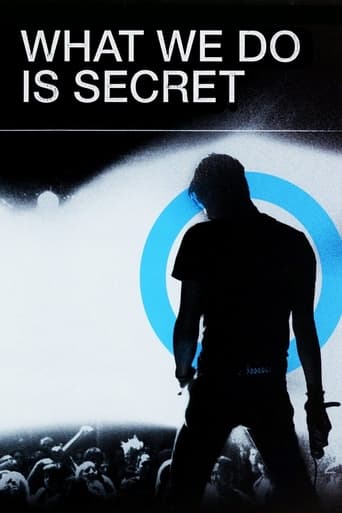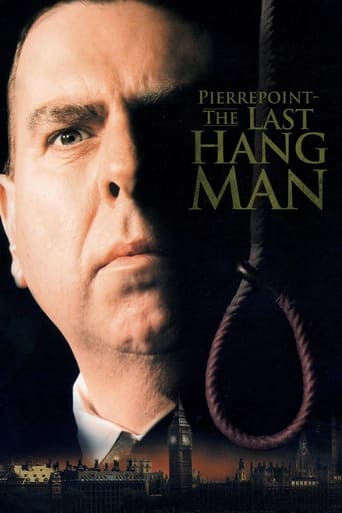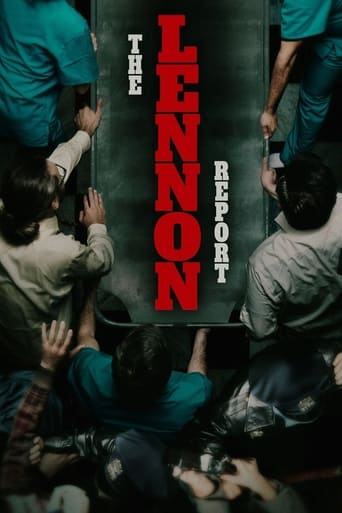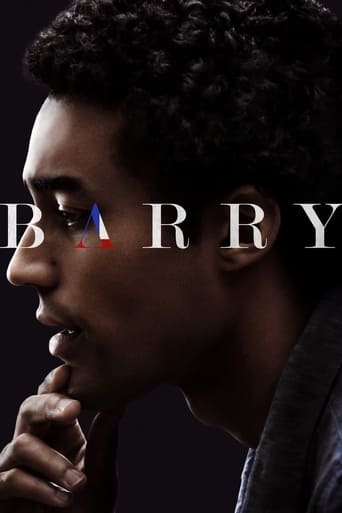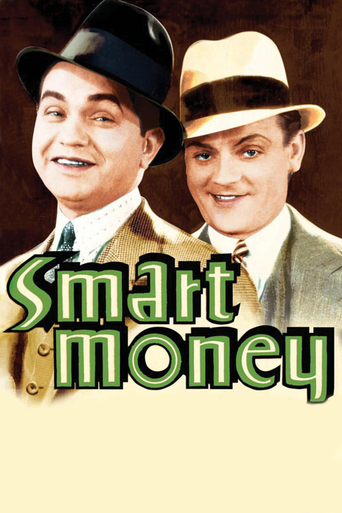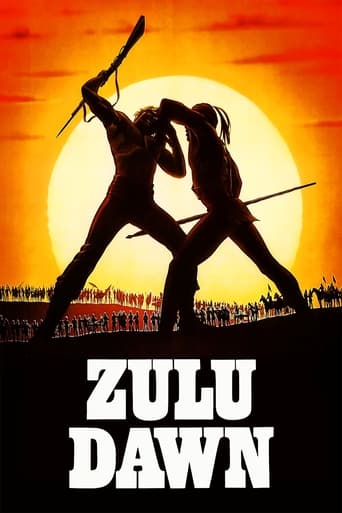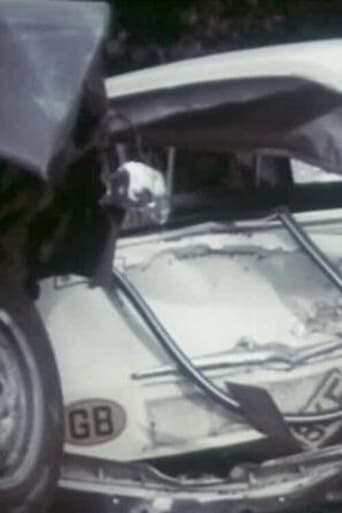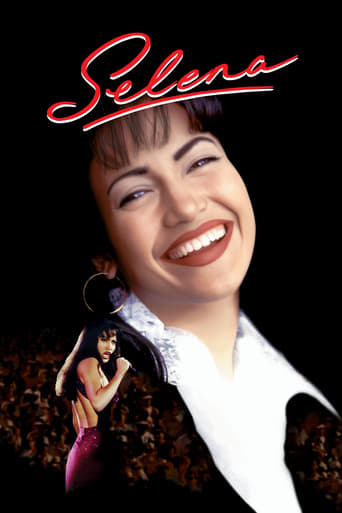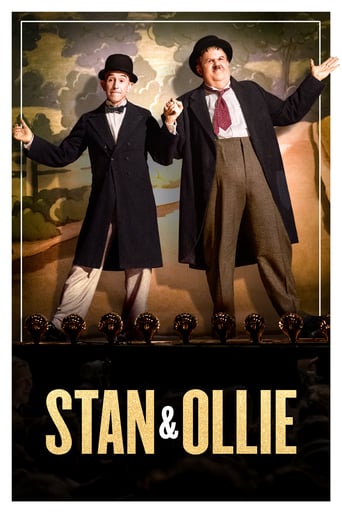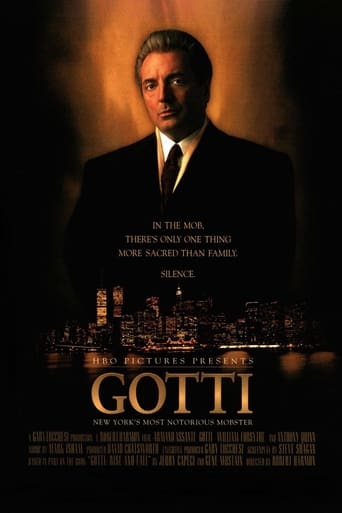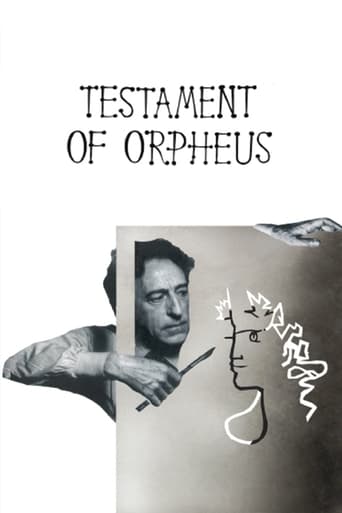
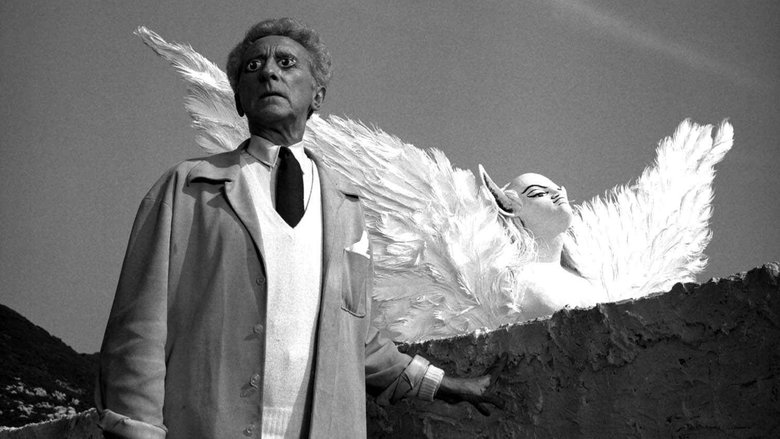
Testament of Orpheus (1962)
Outside time and reality, the experiences of a poet. The judgement of the young poet by Heurtebise and the Princess, the Gypsies, the palace of Pallas Athena, the spear of the Goddess which pierces the poet's heart, the temptation of the Sphinx, the flight of Oedipus and the final Assumption. This film is the third part of Cocteau's Orphic Trilogy, which consists of The Blood of a Poet (1930), Orpheus (1950) and Testament of Orpheus (1960).
Watch Trailer
Cast


Similar titles
Reviews
As I stared at Picasso, he stared at me the same way. But let's not start browsing the newspaper by reading the sports news. This is the last film of Cocteau, film, marked by the built in time style and it constitutes a legacy of Orpheus, the way it is will or inheritance, if you will, of the director himself.As the third part of the trilogy, it is the walking of a full circle in the human being done in two ways - on a personal level, from childhood and the first life, old and last life and historically, from mythology to science and modernity. On foreground is the idea of the fateful moment in our existence, the intersections of our past, present and future existences, still seeking their own sense separated from one another, and the constant questioning of the miracle of the human presence. Poetry and science, holding hands, are grinding up to interfere in the mysteries of the mythological story. Their results are not greatly productive, but they are and give comfort to those who have been vocated to them. We are shown the most severe a burden and that is to being a judge of others and instead of indulging in space-time, to get security logic and predictability. Somewhat Kafkasian, those who stand before the law, are waiting their trial. The director shows his ability to see the development of different actions and characters in a long time plan, and also provide his place into them.The development of action shows us that more important are the desire and ability than the effect and power of cash rivers. To such titles we can turn only to sigh, because they are uttered as pieces of rock of the time and the history of cinema that are long forgotten and kicked out of the way of modern man that took a sharp turn, passing them with their topless cars.http://vihrenmitevmovies.blogspot.com/
One can view this movie, and find themselves asking themselves by the end, what did they watch? The movie has very confusing that tossed all logic out of the window. One might think it's a continue story of Orpheus (1950) with the opening scenes, but the series of symbolic encounters and surreal images more resembles The Blood of a Poet (1930). This movie might be considered the final part of the Orphic Trilogy, but it's just a film that is a petrified fountain of thought, in my opinion. In his last film, legendary poet/film maker Jean Cocteau portrays an 18th century poet who travels through time on a quest for divine wisdom while seeing his past work come back alive due to his inspirations and obsessions with them. Cocteau's persona is unstuck in time, and materializes in and out to episodically interact with various characters such as two judges who essentially put Cocteau's life on trial, some mimes dressed like horses, a camp of gypsies and a professor who apparently enabled this time travel through inventing a bullet which flies faster than light. In the opening narration, Cocteau alternatingly calls the movie "a striptease show where I take off my body to reveal my soul" and "a poet's legacy to the youth which has always supported him." Testament of Orpheus brings full circle the journey Cocteau began in The Blood of a Poet, an exploration of the torturous relationship between the artist and his creations. In a mysterious wasteland, he meets several symbolic phantoms that bring about his death and resurrection. In the end, the film is mostly a tribute to himself and him looking back at his work before accepting his death. Too bad, the movie doesn't truly show that. Instead, the audience gets an phantasmagorical whirl of imagery, tragedy and an enormous, transcendent sense of wonder. The movie works as an art surreal film, as the movie goes from one dream sequence to another. The film use great work of imagery. Mirrors, horses, flowers, tapestries, are used to represent Cocteau's past. His special effects and camera tricks are always a highlight of his work, as he sees slow motion walk scenes, and selective color. My favorite is the backwards-motion. A great example of this is how the punctured, smoke-filled balloon reassembles or a burned photograph is restored. Others are an erased blackboard sketch reappears. A draped sheet flies upward. Cegeste jumps out of the ocean, perfectly groomed. And the lengthiest example is the meticulous repair of a torn-up hibiscus flower. Check them out, it's probably the best high lights of the film. The film was shot on location at Les Baux in the South of France and it's beautiful. The movie also host a few famous cameos such as Pablo Picasso, Jean-Pierre Leáud, Jean Marais and Yul Brynner. The music is charming. Most of the film is Handel. Concerto in A minor, Op.6. While it's the best of the trio, it's nowhere near a good film. It's a bit pretentious, stiffly acted and cinematically dated. His lack of writing skills can be seen in this undeniably dreadful screenplay, loaded with the most clichéd statements about poetry and art, and the most trite and incongruous imagery imaginable. The scenes with a man walking about with a fake horses head might be a bit silly today. By contrast, Cocteau's symbolism is so heavy-handed, so obvious, and so manifold that they have little real-world referents so they can be hardly understood by the average viewer. The scene with the faster than light bullets is weird science, Cocteau brings them into the past so the professor can shoot him, thus sending him back in time. How all that works is left unexplained. In a way, the movie is full of mixed imagery that rarely makes any sense to anybody, but Cocteau himself. In the end, Cocteau, the poet movie maker, nobody has reached higher doing poetry with images. Nobody. Rather than being a complete ego trip, it is closer to what Fellini did in "8 1/2", a similar work of genius, where the soul is searched, a document is made with all the art and craft the director can bring, and doesn't matter if the audience get it or not. Once Cocteau vanishes for the last time, the film ends. "If you didn't like it, I'm sorry," he humbly adds. Check it out if you're a huge Cocteau fan, if not, research more about him before watching this film.
Cocteau must have been quite vain to make a film of his life and star in it. What a waste of time. Pretentious dialog, dated special effects, a penurious set, over-studious acting, and a score that just did not fit.The dialog was stilted and affected: it did not make any sense at all. Maybe it did to Cocteau but even that I doubt. It was full of enigmatic and obtuse references to who-knows-what? I suspect Cocteau just went overboard in tangential talk.The special effects were embarrassing but done with such gravity that you had to take a double-take at the vapid seriousness displayed.The only actor worth seeing was Yul Brynner. Cocteau should have stayed on the other side of the camera. He was not an actor just like Hitchcock was not. Cocteau should have learned from Hitchcock and just had a cameo role. It actually became painful watching him move deliberately from scene to scene. Not that the scenes made any sense except in his poor attempt at stitching his memories together.The main set was a ruined building built with large blocks but it had peoples' initials scored on their faces. So a scene that was intended to be somber or meaningful had scrawls of past visitors clearly visible. Whatever effect Cocteau intended was lost by the distractions. The set was messy too. Could not it have been cleaned and swept for heaven's sake? The acting in general was amateurish. There was no spontaneity, no joie de vivre; nothing to show Cocteau led anything but a pretty boring life. Surprising really when you know he was responsible for Beauty and the Beast, one of my favorite movies. But that had Jean-Alfred Villain-Marais and Josette Day in it.The music was empty and powerless. I have just watched the movie and cannot even remember any part of the score. If you are going to write a score for a movie make some of it memorable.
The third film in the so-called Orphic Trilogy of Jean Cocteau, Testament Of Orpheus (Le Testament D'Orphée, Ou Ne Me Demandez Pas Pourquoi!), is also the third film in The Criterion Collection release boxed set, and while it's the best of the trio it's nowhere near a good film. It does have perhaps the best scoring, and a dozen or so moments in its eighty minutes that have some spark of creativity, but Cocteau is so narcissistic and the film so self-indulgent and replete with outdated special effects, such as Cocteau running film in reverse on numerous occasions, that one feels almost embarrassed for him. Also, the previous two entries in the trilogy set the bar so low that Cocteau did not really have to do much to improve upon their failures, and he didn't do much.Despite his claims to the contrary, Cocteau was certainly no poet of any stature, and his lack of writing skill can be seen in this undeniably dreadful screenplay, loaded with the most clichéd claims about poetry and art, and the most banal and absurd imagery imaginable- even as Cocteau believes it is deep. Part of the odd charm of the film, and its predecessors, is that Cocteau really does believe the crap he spews. At one point in the film he even states, 'It is the unique power of the cinema to allow a great many people to dream the same dream together and to present illusion to us as if it were strict reality. It is, in short, an admirable vehicle for poetry.' Not only is the sentiment false and highfalutin', but it's read by Cocteau with such earnest inanity that one wonders whether he really could believe such tripe and not have to restrain a guffaw.Testament Of Orpheus is the least embarrassing of the so-called Orphic Trilogy, but it still does not rise above the sci fi schlock of the 1950s, films which often had bold premises, but failed merely in technical and acting aspects. This film is not even bold. It's puerile and trite, and Cocteau is an embarrassment to all real poets. The cinematography by Roland Pontoizeau is often framed poorly, and the music by Georges Auric is woefully inappropriate in many places. Had Cocteau actually been a real artist, this film, and perhaps the whole trilogy and his canon, may have been intriguing glimpses into meta-film, decades before the twin banes of Abstract Expressionism and Postmodernism dulled contemporary painting and literature. Even the often repetitive Charlie Kaufman scripted films of recent years are leagues ahead of this garbage, in terms of narrative twists, depth, and real characterization. Instead, Cocteau was a jack of all arts, and a master of none, a narcissistic unwitting walking cliché in the flesh. I tire of apologists for this sort of manifestly bad art who always try to claim that a work of art that is so terrible is simply 'too deep', or any other such nonsense, to be properly critiqued. While truly great art has often been dismissed in this manner by bad critics, Testament Of Orpheus is not only not great art, but manifestly bad art. Its premises and claims are easily seen through, for they are so shallow, and that is what kills it as a film. One can only wonder what part they had in Cocteau's demise. One can dream, can't one?


